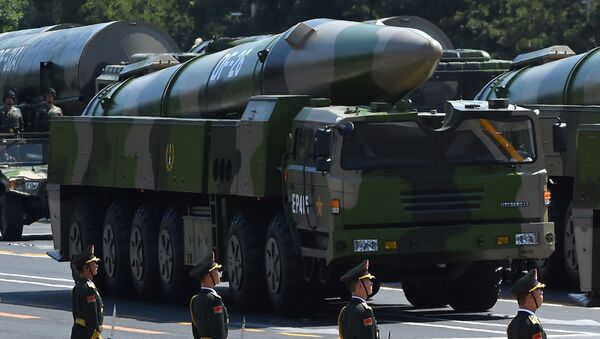Speaking at a monthly press conference, Defense Ministry spokesman Wu Qian said that the Chinese military had introduced into service the DF-26 intermediate range ballistic missiles, dubbed “Guam killer” in Chinese media for its ability to attack the US naval base in the Pacific Ocean both with a conventional or nuclear weapon.
“The series of operations we are carrying out is directed against Taiwan independence forces and activities in the island. Their purpose is to prevent that the Taiwan independence forces’ plot damages the welfare of the Taiwanese people. If the independence forces continue to wantonly take rash actions, we will take further action,” Qian said.
While Chinese state media blamed the drills on Taiwan, calling them a direct response to its “provocations,” Taipei accused China of “saber rattling.”
READ MORE: Taiwan and China Practice for Cross-Strait War With Live Fire Drills
Last week, China’s Air force also confirmed that nuclear-capable H-6K bombers had conducted a “sacred” military patrol mission, circling Taiwan.
“China has deliberately manipulated [the exercise] to pressure and harass Taiwan in an attempt to spark tensions between the two sides and in the region,” Taiwan’s Mainland Affairs Council spokesman Chiu Chiu-cheng told reporters, adding that Taipei “will never bow down to any military threat or incentive.”
US Taiwan Travel Act Sends False Signals
Since April 18, China has been conducting a series of exercises around Taiwan, which Beijing regards as a breakaway province. The drills followed the signing of the Taiwan Travel Act into law by the United States, which would encourage state visits between officials of the two sides – China’s Foreign Ministry has consistently slammed the law, saying that it contradicts the “One-China policy” and would lead to a deterioration of the situation in the region and spur more tensions between Beijing and Taipei.
"We firmly oppose the US side signing the 'Taiwan Travel Act' and have lodged stern representations with the US side…. The 'Taiwan Travel Act' sends out very wrong signals to the 'pro-independence' separatist forces in Taiwan," Chinese Foreign Ministry spokesman Lu Kang said in a statement.
The Trump administration has been strengthening its ties with Taiwan, which is considers a stumbling block in US-China relations: Taiwan is one of the most sensitive issues for Beijing — while the People’s Republic of China and Taiwan, officially known as the Republic of China, technically remains a single country, each considers the other a “renegade province.”
"We urge the US side to correct its mistake, stop pursuing any official ties with Taiwan or improving its current relations with Taiwan in any substantive way, and handle Taiwan-related issues properly and cautiously so as to avoid causing severe damage to the China-US relations and cross-Straits peace and stability," the spokesman stressed.
In summer 2016, Chinese diplomats formally suspended contacts with Taiwanese officials as a result of President Tsai Ing-wen’s refusal to support the idea of a unified China.


